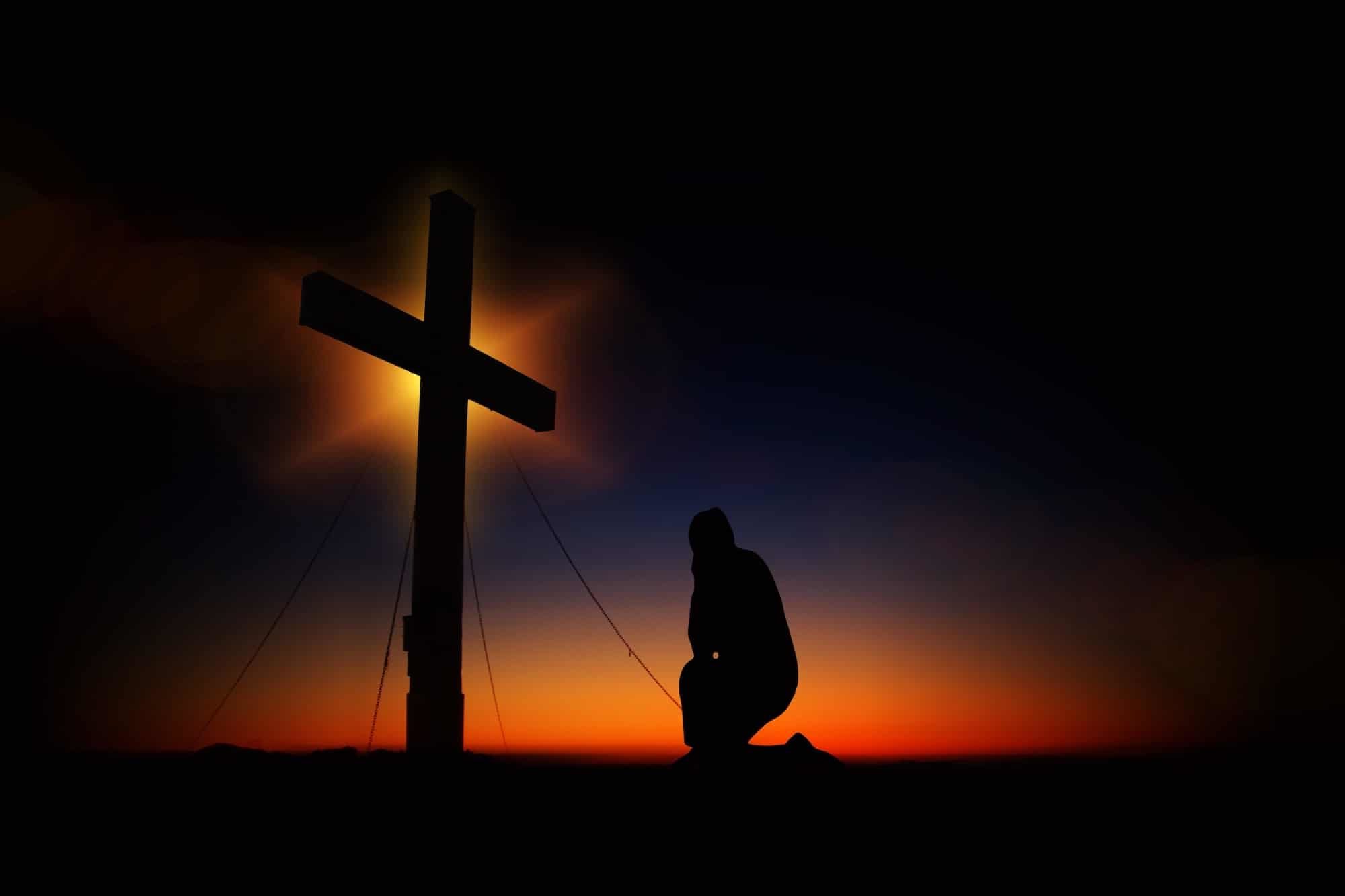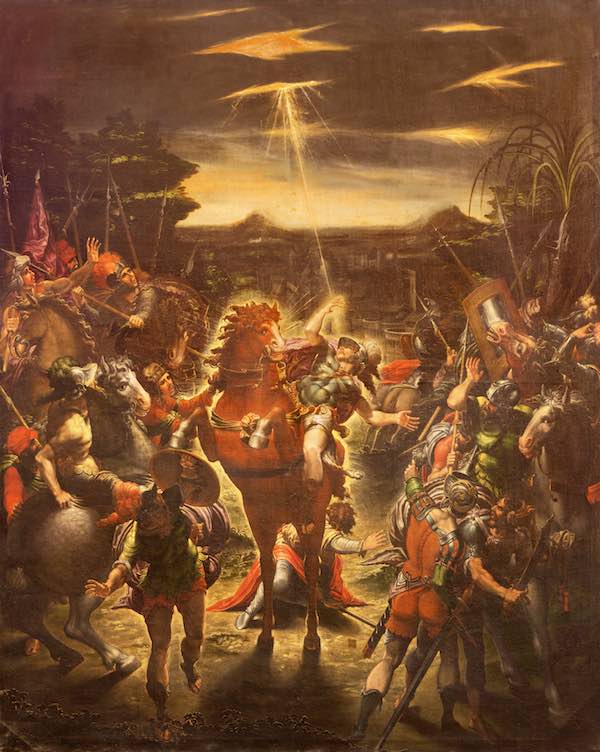“But I fear, lest somehow, as the serpent deceived Eve by his craftiness, so your minds may be corrupted from the simplicity that is in Christ. For if he who comes preaches another Jesus whom we have not preached, or if you receive a different spirit which you have not received, or a different gospel which you have not accepted – you may well put up with it!” (2 Cor 11:3-4)
WHAT IS THE GOSPEL?
SYNOPSIS: A theological landscape of rabbit tracks – Spoon-fed babes in Christ or mature believers? – The plumbline for thinking for ourselves – What did the apostle Paul say was of “first importance” – The gospel message: too simple for some people? – God’s creation account links to the greatest commandment – Our Creator upholds and reiterates “the history of the heavens and the earth” again and again and again – The consequences of maintaining a lie – What is the biblical definition of “the church”?
I believe there are many sincere followers of Christ who are zealous to seek out “truth” and to share it with others. This passion is commendable – it is a wonderful godly characteristic to diligently apply our heart and mind to a matter (Ecc 9:10; Col 2:23).
In contrast to this attitude, the Lord warns of the dangers of losing our enthusiasm and first love, or becoming lukewarm or spiritually dead in the faith (Rev 2:4; Rev 3:26, 1).
In Matthew 25, Jesus tells his disciples the parable of the five wise and five foolish virgins – about those who kept their spiritual lamps filled with oil and those who did not – and the serious consequences for those whose lamp went out because they were not prepared when the bridegroom unexpectedly arrived.
Jesus followed on with the parable of the talents.
“For the kingdom of heaven is like a man traveling to a far country, who called his own servants and delivered his goods to them. And to one he gave five talents, to another two, and to another one, to each according to his own ability; and immediately he went on a journey. Then he who had received the five talents went and traded with them, and made another five talents. And likewise he who had received two gained two more also. But he who had received one went and dug in the ground, and hid his lord’s money. After a long time the lord of those servants came and settled accounts with them.” (Matt 25:14-19)

Those who doubled their talents were commended, and those who did not were condemned.
The moral of the story is that we are accountable to God to multiply the talents and gifts he has given us, for his glory. Those who do are called “good and faithful servants”. Those who don’t are called “wicked and lazy servants”. But sincerity and zeal are not enough – a person’s faith must be rooted in what the Bible says, and not what people want the Bible to say (1 Cor 3:18). This is because truth is defined by God not us (John 17:17). And if we do not abide in his truth and the application of his love (1 Cor 13:13) then our sincerity and zeal is worthless, or even dangerous by leading us, and others, off track.
And the most effective way for us to know if we are on track with God’s truth is to immerse ourselves in his Word – the Bible. As the apostle Paul tells us:
“All Scripture is given by inspiration of God, and is profitable for doctrine, for reproof, for correction, for instruction in righteousness, that the man of God may be complete, thoroughly equipped for every good work.” (2 Tim 3:16-17)
One believer I know, for example, has an audio of the Bible playing quietly in the background of their home on a continuous loop. Others read the Bible from cover to cover every year. One person I am aware of has done this for 25 years.
“… that we should no longer be children, tossed to and fro and carried about with every wind of doctrine, by the trickery of men, in the cunning craftiness of deceitful plotting, but, speaking the truth in love, may grow up in all things into Him who is the head – Christ –.” (Eph 4:14-15)
Part of the reason some Christians find theological rabbit tracks so seductive – i.e. they search out deviations from God’s Word – is because they do not see the Bible as sufficient. (Refer to ‘Conclusions’.) In some cases, they are part of a church culture that has been built on, and prides itself on, having distinctives. That is, “special knowledge” that is different from everyone else and which is elevated above foundational doctrines of the Christian faith. Unwittingly, these people have been led to a watered down or ill-defined gospel message.
I know this for a fact – because I was one of those people for many, many years.
christian maturity – the ability to think for oneself
In the Book of Hebrews, the writer addresses the Jewish Christians living in Jerusalem, chastising them for immature faith. These “babes in Christ” were dull of hearing and unskilled in discerning truth from falsehood. He writes:
“… of whom we have much to say, and hard to explain, since you have become dull of hearing. For though by this time you ought to be teachers, you need someone to teach you again the first principles of the oracles of God; and you have come to need milk and not solid food. For everyone who partakes only of milk is unskilled in the word of righteousness, for he is a babe. But solid food belongs to those who are of full age, that is, those who by reason of use have their senses exercised to discern both good and evil.” (Heb 5:11-14)
Looking back I am shocked to realise that I had been a babe in Christ for 26 years! I say “shocked” for a very good reason. From the beginning of my walk with Christ, I turned my worldly life around and attended church every week. I diligently took notes of the sermons, understood repentance, tried to obey God’s commandments as best I could and I studied my Bible and prayed most days. I was also involved in supporting other ministries. I grew in faith and the Lord was with me, guiding me and answering my prayers.

But, and this is the crucial part, I never really questioned if what I was being taught on any given topic matched the MAJORITY of Scriptures in the WHOLE Bible. Like a baby I was being spoon fed and trusted the ministry and the church I was attending to lead me into all truth. And one of their doctrines was the gap theory, which I accepted without question.
This attitude, believing everything the ministry said, had been instilled in me from the beginning, because the first church I attended nurtured this dependency to the point where members who questioned anything were seen as divisive and falling away from the faith. Without realising it, I had embraced the idea that “the church” was a physical and administrative organisation and spiritual authority.
Ten years later this church’s entire theology changed course 180 degrees – from being legalistic to being liberal. Nevertheless, I remained there, convinced I was still in the right place. It was not until I was specifically challenged on the subject of creation 16 years later (with the introduction of theistic evolutionary theology) that I was motivated to start thinking for myself. Four years after working through the unbiblical consequences of that creation narrative, I left to join another fellowship. But within only a few months, I was challenged on the matter of creation yet again, only this time it was on the gap theory. And, once again, I launched into an investigation. This time lasting five years.
Never could I have imagined that by firmly taking hold of the doctrine of creation, as it is plainly described in Scripture, I had grasped a thread that would help me unravel and identify so many distorted and false doctrines I had accepted as truth, including the fact that I had been taught skewed gospel messages for 35 years!
Only then did I realise the need for each believer to learn discernment by placing their faith in the totality of God’s Word, not man’s word about God. Our great Creator God instructs us to study his word, which is a lamp to our feet and a light to our path (Ps 119:105) and to take the personal responsibility to “work out your own salvation with fear and trembling” (Phil 2:12).
“But you, do not be called ‘Rabbi’; for One is your Teacher, the Christ, and you are all brethren. … And do not be called teachers; for One is your Teacher, the Christ.” (Matt 23:8-10)
“These things I have written to you concerning those who try to deceive you. But the anointing which you have received from Him abides in you, and you do not need that anyone teach you; but as the same anointing teaches you concerning all things, and is true, and is not a lie, and just as it has taught you, you will abide in Him.” (1 John 2:26-27)
Even the apostle Paul did not claim authority over another person’s faith but saw himself as a fellow worker in the faith.
“Now He who establishes us with you in Christ and has anointed us is God, who also has sealed us and given us the Spirit in our hearts as a guarantee. … Not that we have dominion over your faith, but are fellow workers for your joy; for by faith you stand.” (2 Cor 1:21-22, 24)
It must be said that I did receive some good teachings in these churches and I do not claim that anyone deliberately deceived me. Rather, the ministry were merely passing on what they themselves had been taught and accepted as truth (as I myself had done). Furthermore, it was no one’s fault but mine that I took so long to realise my error.
Sadly, this is true for so many Christians, including ministers. And when it comes to legalistic churches, most ministers are simply unwilling and ill-equipped to examine long-held and treasured doctrines in light of Scriptures to the contrary. Some even actively discourage the Berean Bible study method among their members, by dismissing, criticising or threatening those who do search the Scriptures and ask questions when the church’s teachings do not align with God’s Word. This, of course, all depends on how controlling a church organisation is.

All of which has shown me just how much of a hold deception can exert over a person who thinks they could not be deceived. As the old English proverb goes: “There are none so blind as those who refuse to see”. Or in the words of God himself: “‘Hear this now, O foolish people, Without understanding, Who have eyes and see not, And who have ears and hear not: Do you not fear Me?’ says the LORD. ‘Will you not tremble at My presence…?’” (Jer 5:22). “… But on this one will I look: On him who is poor and of a contrite spirit, And who trembles at My word” (Is 66:2).
If a person believes they have all truth, they will see no need to “test all things” (1 Thess 5:21), nor to “search the Scriptures daily to find out whether these things are so” (Acts 17:11)? And how is it possible for someone who thinks they already know everything “to grow in grace and knowledge” (2 Pet 3:18)? Also, why would such a person, with seemingly nothing to learn, see a reason to follow God’s instructions to “Get wisdom! Get understanding!” (Prov 4:5)? And what is the point of God telling us to “cry out for discernment, and lift up your voice for understanding” if we already have our full share (Pro 2:3)? Furthermore, if we are incapable of being deceived, why do we need to pray “teach me good judgment and knowledge” (Ps 119:66) and “Lead me in thy truth” (Ps 25:5)? Are all these Scriptures really redundant to some people? Are they redundant to us?
Interestingly, this exploration into the gap theory has also revealed to me the bountiful love and mercy of God. This is because he can still work with individual believers inside church organisations that hold a combination of truth and error to varying degrees.
After realising that I myself had been guilty of not attempting to “prove all things”, I conducted an experiment. I asked many people around me if they could explain what the gospel message was, and almost all were unsure or did not know (including devout believers who had attended church for 40 or 50 years)! Others responded with a distorted gospel message, which was only partially true. And when I made plain the gospel, as proclaimed by the apostle Paul – that Christ’s death and resurrection were “of first importance” (1 Cor 15:1-4) – some people even dismissed it as being (perceived) as too simple, because, as I was told, “everyone knows that”.
Maybe so, but does everyone appreciate the depth of what Christ has done for them personally, and what this means for us individually and for all mankind? Are we humbled by this knowledge and do we thank God every day, or would we rather go in search of “something more interesting” and only think about it now and then or once a year at The Lord’s Supper? When we focus on the meaning of the Cross, we focus on the depth of God’s grace and love for us, the corollary of which is to walk the path Jesus commanded.

“For God so loved the world that He gave His only begotten Son, that whoever believes in Him should not perish but have everlasting life.” (John 3:16)
“This is My commandment, that you love one another as I have loved you. Greater love has no one than this, than to lay down one’s life for his friends.” (John 15:12-13)
And the fact is, all theological rabbit tracks are a deviation from that path. That is the reason I have created this website, to share what I have learnt about the great deception of the gap theory (or any other old-earth creation theory) and how it does affect our faith and understanding of God and his Word.
This is because any other explanation of the creation account, to that which God has clearly described in Genesis, strikes a mighty blow to the heart of fundamental Christian doctrines and the true gospel message.
Fortunately, God is loving, patient, kind and slow to anger, and he does not want any one of us to fail (Ps 86:15; Rev 2 and 3).
“But thou, O Lord, art a God full of compassion, and gracious, longsuffering, and plenteous in mercy and truth.” (Ps 86:15)
“… being confident of this very thing, that He who has begun a good work in you will complete it until the day of Jesus Christ.” (Phil 1:6)
What the gospel is not!
Some time ago, I came across a very interesting YouTube video by Christian author Dr John Williams Robbins, ‘Evangelism and the Defense of the Faith’. Robbins explained that evangelism and the defence of the faith cannot be grasped until some elementary ideas are realised. In earlier times, he said, these ideas were thoroughly understood by Christians and even those who profess to be believers, but this is no longer so in our 21st century postmodern culture. Rather, many churches today are more interested in intellectual theorising, searching for special knowledge or chasing spiritual experiences.
The root of the word evangelism, he explained, is to take the gospel (good news) into all the world (Mark 16:15-16). But what is the good news? What is the gospel? He followed by providing a long list of what the gospel is not, which is too lengthy for me to include here. After this, he went straight to a number of Scriptures that explain exactly what the gospel is. It is to proclaim the death and resurrection of Jesus Christ for the forgiveness of sins by God’s grace; our required response to it – belief, repentance, baptism and the keeping of his commandments (John 14:21-23), and to grow in the fruit of the Spirit (Gal 5:14-26). The gospel also proclaims the kingdom of God, from its inception to its fruition.
The apostle Paul preached what should be “of first importance” in our lives. If it is not, we have believed in vain.

“Now, brothers and sisters, I want to remind you of the gospel I preached to you, which you received and on which you have taken your stand. By this gospel you are saved, if you hold firmly to the word I preached to you. Otherwise, you have believed in vain.
“For what I received I passed on to you as of first importance: that Christ died for our sins according to the Scriptures, that he was buried, that he was raised on the third day according to the Scriptures…” (1 Cor 15:1-4)
And Jesus tells us what our response must be to the good news of the kingdom:
“Now after John was put in prison, Jesus came to Galilee, preaching the gospel of the kingdom of God, and saying, ‘The time is fulfilled, and the kingdom of God is at hand. Repent, and believe in the gospel.” (Mark 1:14-15)
The first stage of the kingdom of God would begin in the hearts and minds of repentant believers. This event would occur with the coming of the Holy Spirit at the commencement of the first century church on the day of Pentecost. It would start as small as a mustard seed and be unobservable to the eye (Mark 4:30-31). Jesus described it thus: “The kingdom of God does not come with observation; nor will they say, ‘See here!’ or ‘See there!’ For indeed, the kingdom of God is within you,” (Luke 17:20-21).
The second stage will be when the whole world witnesses Christ’s return in power and glory as King of kings, Lord of lords and Prince of Peace. “Behold, He is coming with clouds, and every eye will see Him, even they who pierced Him. And all the tribes of the earth will mourn because of Him. Even so, Amen” (Rev 1:7).
I acknowledge there are various eschatological views and, as a pre-millennialist, it is my understanding that when Christ returns he will rule over the earth for 1000 years with the saints, who will be in the first resurrection (Eph 1:21). “And they lived and reigned with Christ for a thousand years. But the rest of the dead did not live again until the thousand years were finished. This is the first resurrection” (Rev 20:1-10). “And he who overcomes, and keeps My works until the end, to him I will give power over the nations” (Rev 2:26).
After this millennial period, when Christ has vanquished all enemies, He will deliver the kingdom of God to the Father and there will be a new heavens and a new earth.
“Then comes the end, when He delivers the kingdom to God the Father, when He puts an end to all rule and all authority and power. For He must reign till He has put all enemies under His feet.” (1 Cor 15:24-25)
“That in the dispensation of the fulness of times he might gather together in one all things in Christ, both which are in heaven, and which are on earth; even in him.” (Eph 1:10)
“Now I saw a new heaven and a new earth, for the first heaven and the first earth had passed away. Also there was no more sea. Then I, John, saw the holy city, New Jerusalem, coming down out of heaven from God, prepared as a bride adorned for her husband.” (Rev 21:1-2)
Having explained that, I would now like to examine just one distorted gospel message. The one I was taught.
Yes it does proclaim salvation through Christ’s crucifixion and resurrection and the kingdom of God, but it is only partially based on the Bible’s description. This is because it is fashioned on the false creation doctrine of the gap theory.
That is, it holds the erroneous belief that Satan is the ruler of the earth and lord over all nations (in direct conflict with Rom 13:1), and that the kingdom of God cannot commence until Christ physically returns to bind the devil and take his throne through force. (Refer to Chapter 4, ‘The Devil Cast Down to the Earth’.)
Consequently, this church teaches the second-stage fulfillment of the kingdom of God: that when Christ returns, he will set up his kingdom on earth. However, the first stage, in which Christ began the kingdom as small as a mustard seed among his people, at the commencement of his church 2000 years ago, is rejected. So although the Bible says that believers are now citizens of heaven under the lordship of Jesus Christ, this church teaches that believers are still citizens of the earth under the god of this world, until Christ returns.
These are two very different views about our status before God and our relationship with Christ.

It is too long and complicated to go into details here about how the gap theory creation narrative and its ensuing faulty concept of the kingdom of God has infected so many of that church’s doctrines. But, suffice to say, it has resulted in a legalistic church where believers are regarded as citizens of this world, and obedience to the Law is seen as somewhat justifying them before God. The apostle Paul, however, explains clearly what should be of “first importance” – that Jesus Christ died for our sins (1 Cor 15:3).
“… knowing that a man is not justified by the works of the law but by faith in Jesus Christ, even we have believed in Christ Jesus, that we might be justified by faith in Christ and not by the works of the law; for by the works of the law no flesh shall be justified.” (Gal 2:16)
In fact, Christ doesn’t get much of a mention at all in that church, which is hardly surprising when we consider how much the devil’s power and role have been embellished in its gap theory teachings. I clearly remember one sermon that did focus on Jesus, but only after the speaker had first apologised, because he did not want to sound “Protestant”. Afterwards, some said we should not focus on Jesus but on the Father. Not only that but members are not encouraged to personally share their faith with others but rather to leave the “preaching of the gospel” to the church’s media (through their tithes and offerings).
Part of the collateral damage of such a twisted gospel is that any talk of God’s love is automatically equated to lawlessness and thus rarely mentioned. In fact, we barely ever had a sermon on God’s love and none at all on God’s grace (that I can remember). Messages on faith were also in short supply. The outcome was a complex web of truth and falsehoods and a Christian journey that was all about individuals working to establish their own righteousness in order to qualify to become kings and priests in the coming kingdom (Rev 5:10).
Unwittingly, perhaps, this perspective seeded an attitude of judgmentalism and a focus that was more on oneself than on Christ.

Tracing the serious errors of a skewed gospel brings me back to the essence of this exploration – the importance of standing on the foundation of the creation story as told by God and penned by Moses. And I urge anyone who struggles with faith that God CREATED all things in heaven and earth out of nothing in six days, and rested on the literal SEVENTH DAY of create time, to take this matter seriously and ask Him for help: “Lord, I believe, help my unbelief” (Mark 9:24) and to follow the Scriptures/evidence wherever it leads.
After all, it can be no small matter that God has repeated his six-day creation account, of how and when the physical realm came into being, three times in two verses in Genesis 2 alone – just in case we didn’t get it the first time, or the second time! And, once again, there is not one mention of a re-creation or any more than a one, seven-day period for the creation week.
“Thus the heavens and the earth, and all the host of them, were finished. And on the seventh day God ended His work which He had done, and He rested on the seventh day from all His work which He had done. Then God blessed the seventh day and sanctified it, because in it He rested from all His work which God had created and made. This is the history of the heavens and the earth when they were created, in the day that the LORD God made the earth and the heavens before any plant of the field was in the earth and before any herb of the field had grown.…” (Gen 2:1-5)
And as if the above Scriptures were not enough, God repeated his creation account again and again, to Moses who wrote it down as he was commanded (Num 33:2).
“For in six days the LORD made heaven and earth, the sea, and all that in them is, and rested the seventh day: wherefore the LORD blessed the sabbath day, and hallowed it.” (Ex 20:11)
“It is a sign between Me and the children of Israel forever; for in six days the LORD made the heavens and the earth, and on the seventh day He rested and was refreshed.” (Ex 31:17)
GOD’S WORD MUST BE OUR AUTHORITY
Jesus, the Good Shepherd, knew the faith of believers would be severely tested in the latter days, and he prayed earnestly to the Father to protect His sheep. “I am the good shepherd; and I know My sheep, and am known by My own” (John 10:14). But that protection is only available if we place our faith in the truth as expounded in the written Word of God and not the Oral Law or the written word of men or women. (Refer to Chapter 9, ‘History of the Gap Theory’.)
“I do not pray that You should take them out of the world, but that You should keep them from the evil one. They are not of the world, just as I am not of the world. Sanctify them by Your truth. Your word is truth” (John 17:15-17).
The apostle Peter unequivocally tells us what that gospel is. It is to spread the word about the life, death and resurrection of Jesus Christ, his atonement for the sins of all mankind, and the coming of his kingdom (John 3:16; Mark 16:15). It is to proclaim God’s grace and forgiveness, and our salvation and eternal life, made possible through our belief in what Jesus has done for us, and our response by repenting, being baptised and obeying the commandments of our Lord and Saviour.
“‘Therefore let all the house of Israel know assuredly that God has made this Jesus, whom you crucified, both Lord and Christ.’
“Now when they heard this, they were cut to the heart, and said to Peter and the rest of the apostles, ‘Men and brethren, what shall we do?’

“Then Peter said to them, ‘Repent, and let every one of you be baptised in the name of Jesus Christ for the remission of sins; and you shall receive the gift of the Holy Spirit’.” (Acts 2:36-38)
The gospel message, as penned in the New Testament (the disciple Luke pictured), centres on Jesus’s commission on earth and our required response to it.
Any other gospel is a distortion or false!
“For Christ did not send me to baptise, but to preach the gospel, not with wisdom of words, lest the cross of Christ should be made of no effect. For the message of the cross is foolishness to those who are perishing, but to us who are being saved it is the power of God. For it is written: ‘I will destroy the wisdom of the wise, And bring to nothing the understanding of the prudent.’
“Where is the wise? Where is the scribe? Where is the disputer of this age? Has not God made foolish the wisdom of this world? For since, in the wisdom of God, the world through wisdom did not know God, it pleased God through the foolishness of the message preached to save those who believe. For Jews request a sign, and Greeks seek after wisdom; but we preach Christ crucified, to the Jews a stumbling block and to the Greeks foolishness…” (1 Cor 1:17-23)
“For if I preach the gospel, I have nothing to boast of, for necessity is laid upon me; yes, woe is me if I do not preach the gospel!” (1 Cor 9:16)

The apostle Paul, who was struck down by God on the road to Damascus and taught personally by Jesus Christ for three years in Arabia before he began his ministry, knew the focus of the Christian faith and he did not deviate from it throughout his ministry (Gal 1:11-20).
“I press toward the goal [mark] for the prize of the upward call of God in Christ Jesus.” (Phil 3:14)
“But God forbid that I should boast except in the cross of our Lord Jesus Christ, by whom the world has been crucified to me, and I to the world.” (Gal 6:14)
“And I, brethren, when I came to you, did not come with excellence of speech or of wisdom declaring to you the testimony of God. For I determined not to know anything among you except Jesus Christ and Him crucified.” (1 Cor 2:2)
Paul warned believers to be aware of the devil’s deceptions. This is because if we – laypeople, ministers or theologians – are embarrassed or offended by, or dismiss, the simplicity that is in Christ Jesus and His gospel message, and we insist on maintaining any lie with zeal and intensity, there are consequences.
“So, as much as is in me, I am ready to preach the gospel to you who are in Rome also. For I am not ashamed of the gospel of Christ, for it is the power of God to salvation for everyone who believes, for the Jew first and also for the Greek.” (Rom 1:15-16)
And the consequence of bypassing what is “of first importance” and remaining on a side-track where we began our Christian journey, or becoming side-tracked, will affect our relationship with God to some degree. That is why God instructs us to “Prove all things, hold fast that which is good” (1 Thess 5:21).
God’s Word instructs us to imitate the apostle Paul, as he imitates Christ (1 Cor 11:1). Yet there are many preachers today who claim we should follow them, even though many of their teachings do not match those of Paul’s.
“But I fear, lest somehow, as the serpent deceived Eve by his craftiness, so your minds may be corrupted from the simplicity that is in Christ. For if he who comes preaches another Jesus whom we have not preached, or if you receive a different spirit which you have not received, or a different gospel which you have not accepted – you may well put up with it!” (2 Cor 11:3-4)
(Below painting Four Evangelists by Jacob Jordaens.)

Paul was deeply concerned that the church in Corinth would fall for “another Jesus” and “a different gospel”! He also warned against handling God’s word with deception or distortion.
“Rather, we have renounced secret and shameful ways; we do not use deception, nor do we distort the word of God. On the contrary, by setting forth the truth plainly we commend ourselves to everyone’s conscience in the sight of God.” (2 Cor 4:2)
And in his message to the church in Galatia, Paul was astounded that they were also falling for a false and perverse gospel.
“I am astonished that you are so quickly deserting the one who called you to live in the grace of Christ and are turning to a different gospel – which is really no gospel at all. Evidently some people are throwing you into confusion and are trying to pervert the gospel of Christ.” (Gal 1:6-7)
And in 1 Tim 1:3-4, Paul instructs Timothy to stay in Ephesus “so that you may command certain people not to teach false doctrines any longer” because “such things promote controversial speculations rather than advancing God’s work” and the faith. A little further on, Paul tells Timothy, “Watch your life and doctrine closely. Persevere in them, because if you do, you will save both yourself and your hearers” (1 Tim 4:16). Paul also urges Timothy to “preach the word” because the time will come when the people will embrace “unsound doctrine” by looking to “a great number of teachers to say what their itching ears want to hear”. These people will shut their minds to the truth and correction (2 Tim 4:2-4). Furthermore, the Bible calls to repentance believers in churches that have become compromised with false doctrines, such as those of Balaam and the Nicolaitans, and those who “corrupt the word of God” (Rev 2:14-16; 2 Cor 2:17 ).
And all of these warnings are directed to Christians not those whose minds are veiled (2 Cor 4:3).

Jesus gave the same warning to his disciples (followers), saying that even the elect could be, and some would be, deceived into believing falsehoods, particularly just prior to his return.
When His disciples came to see Him on the Mount of Olives, asking, “What will be the sign of Your coming, and of the end of the age?”, the first warning Jesus gave was this: “Take heed that no one deceives you … many false prophets will rise up and deceive many… See, I have told you beforehand” (Matthew 24). And, as I have learned, all old-earth creation narratives are ready to line up with the greatest deception the world will ever experience. (Refer to Chapter 11, ‘Gap Creationism and the End Time’.)
One things is sure – anyone who is comfortable in the belief that they can’t be deceived is already deceived (Rev 3:17)!
SET FREE FROM THEOLOGICAL SHACKLES BY THE TRUTH OF GOD’S WORD
I now attend a Christian fellowship that endeavours to place its faith completely in God’s Word, which includes the CREATION account as it is plainly described by God in Genesis 1 and elsewhere in the Bible. This church does not look to the “fleshly wisdom” devised by the teachings of one man or a group of men (2 Cor 1:12). (I’ve experienced both over 35 years.) Or, indeed, the teachings of one woman. Nor does it apply “special interpretations” to a few Scriptures that conflict with the plain reading of other Scriptures.
This is a fellowship of believers that wants to grow in God’s truth, and it acknowledges the dangers of deception that we are each subject to. Thus it encourages the application of the Berean principle to prove all things (Acts 17:11).
Most important of all, it does not divert from the gospel message as proclaimed by the apostle Paul. That is because at its heart and core is the appreciation of the magnitude of Christ’s sacrifice as atonement for ours sins and the need to take this knowledge into all the world.
I have also learned the importance of being part of a fellowship that does not define “the church” in physical terms. That is, claiming it is an organisation that has all truth (and is thus infallible) and dictates almost every aspect of what an individual must believe, from which they must not deviate.
Such churches employ a hierarchical system of government ruling from the top down, elevating the ministry and church traditions above the congregation and God’s Word.
From this controlling perspective, the church must come first at all costs and individuals with different points of view are seen as wrong and disposable.
A system like this, based on the “corporate” journey of a church organisation and not the individual believer, cannot, by definition, be founded on the greatest commandment of all – love – as described by Jesus.

“A new commandment I give to you, that you love one another; as I have loved you, that you also love one another.” (John 13:34)
The fellowship I now attend embraces the biblical definition of “the church”, which is the spiritual body of all believers – the ekklesia– Greek for “the whole body of Christians scattered throughout the earth”. And the head of each person is not the ministry, but Jesus Christ. “For there is one God and one Mediator between God and men, the Man Christ Jesus.” (1 Tim 2:5)
Here, each believer, wherever they are, is equally valued for the gifts God has bestowed upon them as “individual” members in the greater body of Christ, which itself constitutes a holy priesthood on a shared journey. This spiritual body is also known as the “invisible church”. These are called-out individuals who have accepted Christ as their Lord and Saviour, not merely visible attendees, or members, of a church organisation (John 6:44,65; John 14:6; 1 Pet 2:9,21; John 15:16; Rom 8:28).
“Then Jesus said to those Jews who believed Him, ‘If you abide in My word, you are My disciples indeed. And you shall know the truth, and the truth shall make you free’.” (John 8:31-32)
“Coming to Him as to a living stone, rejected indeed by men, but chosen by God and precious, you also, as living stones, are being built up a spiritual house, a holy priesthood, to offer up spiritual sacrifices acceptable to God through Jesus Christ.” (1 Pet 2:4-5)
Only through the Cross can we experience God’s grace and forgiveness for our sins, be reconciled to our Creator, receive the gift of the Holy Spirit and eternal life and enter into the Kingdom now. No other doctrine expresses the goodness and mercy of God and “to grasp how wide and long and high and deep is the love of Christ” (Eph 3:17-19).
The question is, do we realise this, and is the enormity of Christ’s sacrifice at the heart of our faith and worship? For he is the only door to enter into the kingdom of God. Or are we busy scampering along theological rabbit tracks, which, at best divert our attention from what really counts, and at worst lead us into serious doctrinal error and away from the cross? Or perhaps we are more focused on trying to establish our own righteousness through obedience to the Law, instead of surrendering to Christ in gratitude and in light of God’s love and grace for us.
In summary, what I have learnt over these last nine years is that ALL old-earth creation narratives deviate from what God has clearly told us and have the potential to take us further and further away from the plumbline of God’s Word and its focus on the Cross.
Images: Gino Santa Maria/Shutterstock.com; iStock.com/CrossEyedPhotography; iStock.com/sedmak; Lightstock; mpaniti/Shutterstock.com; noBorders – Brayden Howie/Shutterstock.com; Pexels; Pixabay; Romolo Tavani/Shutterstock.com; Wikicommons.

“Coming to Him as to a living stone, rejected indeed by men, but chosen by God and precious, you also, as living stones, are being built up a spiritual house, a holy priesthood, to offer up spiritual sacrifices acceptable to God through Jesus Christ.” (1 Pet 2:4-5).
